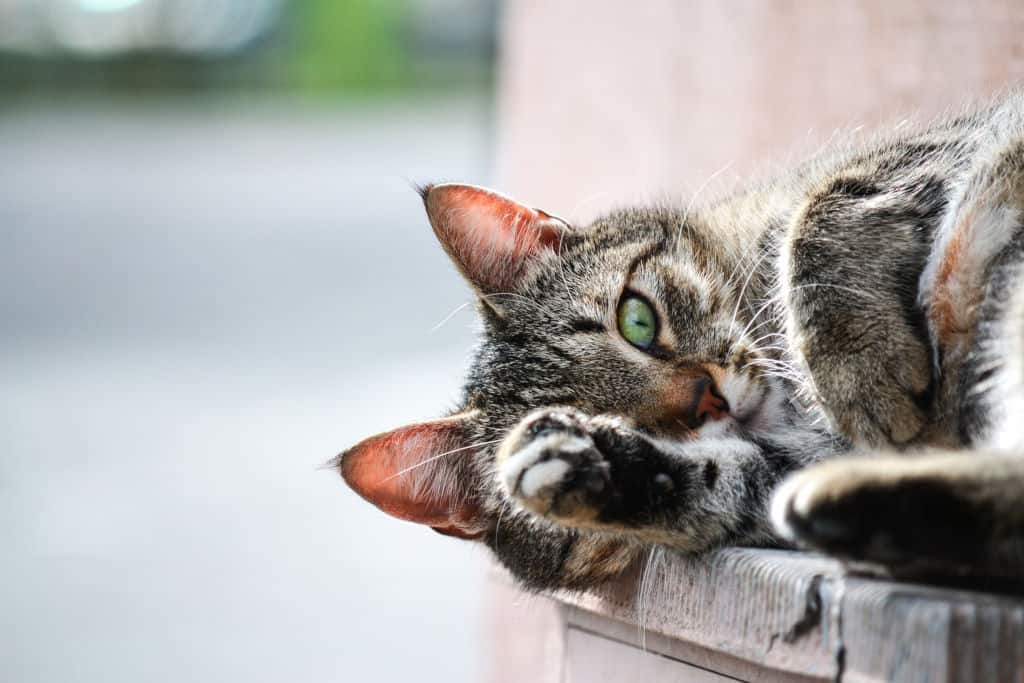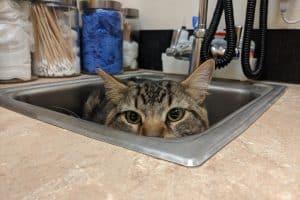Rabies is a virus that infects the brain and nerves. It’s a severe disease, and it’s natural to worry whether your pets will get it, especially kittens. Can they be born with it, though?
Kittens would almost certainly not be born with rabies because the placenta does an excellent job of keeping maternal and fetal blood supply separate. However, they would be at grave risk from the rabid mother’s agony and at risk of getting rabies from their mother’s saliva afterward.
Vertical transmission, from mother to kid, is the term for this type of transmission. Some illnesses are highly good at vertical transmission, but not rabies.
Rabies is extremely unlikely to spread vertically, although this has less to do with defenses and more to do with the fact that rabies never enters the bloodstream.
Giving birth at this moment would be extremely dangerous to the offspring because the mother would no longer be able to perform her motherly obligations and may even horizontally spread the disease at this point (through saliva).

How Often Do Kittens Get Rabies?
Rabies is extremely rare in home cats, but it is a different story in feral or stray cats. Rabies is found in wildlife in many places in the United States, and nothing prevents that species from attacking your outdoor cats.
A kitten would have had to be bitten or scratched by another rabid animal to get rabies. Most kittens would not survive a rabid animal attack and are unlikely to carry the virus.
However, “in rabies, there are no maybes.” Rabies is a major concern for wildlife in many jurisdictions, which means unvaccinated stray domestic animals are at risk.
There’s always the possibility that a kitty will get out and come into contact with something for which it should be vaccinated. Please vaccinate your cats to be safe rather than sorry. Mice/rats and other small creatures frequently enter and build nests in attics, basements, and even our walls.
There is always a risk, even if minor, and annual checkups may prevent any emerging risk or disease.
You may suspect your kitten has rabies or another disease because it continues biting you. However, kittens bite because they are hungry, young, and energetic.
Rabies is rarely found in kittens. Occasional little bites and scratches are a natural aspect of cat ownership, and animals aren’t usually born with rabies. A rabid animal would need to bite them. Because the kittens are so fragile, it is better to give them the vaccine.
What Are the Signs That a Kitten Has Rabies?
It’s hard to tell whether a cat has rabies, but there are a few symptoms you can look for to try and make a reasonable guess.
The following are some of the common rabies symptoms in cats:
- weakness of the legs
- seizures
- difficulty breathing
- excessive drooling
- abnormal behavior
- biting objects
- fly biting (biting at things that aren’t there)
Unfortunately, there is no live rabies test. The only way to tell if an animal has rabies is to check its brain after death. Some areas can be strict and rigid regarding testing requirements involving unvaccinated cats, regardless of the likelihood of the disease being present, given the circumstances.
Here’s a video of a cat reacting to rabies:
Can a Kitten Survive Rabies?
There is no known cure for a cat with rabies. If rabies is detected, the cat must be quarantined and protected from escaping or hurting anyone. The law requires your veterinarian to notify the animal disease regulating authorities.
Rabies is nearly always lethal. Once a cat has been infected and exhibits symptoms, recovery or long-term disease treatment is impossible.
How Long Can a Cat Live With Rabies?
Rabies has an incubation period of three to eight weeks in cats. Once signs show, cats will die within ten days, but usually in about seven days.
Should I Worry if I Got Bitten by a Stray Kitten?
Good general advice is to call your doctor and visit to get a vaccine. They will almost certainly want to give you a tetanus vaccine as well.
However, the odds of getting rabies from cats are incredibly low. Every day, people get bitten by kittens. An infection should be your primary concern. Cat bites are often unpleasant and necessitate antibiotics. Rabies is a concern, but it is a minor one, given that the cat was so young.
If the cat acted normally and showed no signs of the condition, this is not a cause for concern. You wouldn’t have rabies unless this cat was born from an extraordinarily unique chance of a mother who occurred to have rabies or has had an encounter with a rabies vector species.
FAQs
Can you get rabies from a cat scratch?
People typically contract rabies from a rabid animal’s bite. However, in rare situations, individuals can contract rabies through non-bite exposures such as scratches, abrasions, or open wounds exposed to rabid animal saliva.
It is commonly assumed that you can only become infected by bites, but this is not true – you can also become infected if an animal licks a wound or its saliva gets into a wound. In the case of cats, because they lick their paws and bodies, you can become infected if they scratch you or if you pet them with a wound on your hands.
How does rabies usually spread?
Rabies is a virus that is transmitted between mammals through saliva. It is spread through direct saliva contact with broken skin or mucous membranes in the nose, eyes, or mouth. It’s also possible to get infected by getting into direct contact with the brain/nervous system tissue of the infected animal.
Can a vaccinated cat get rabies?
If your pet had their vaccinations on schedule, they should be immune to infection. However, no vaccine is 100% protective. After exposure, the chance of rabies infection varies depending on the nature and intensity of that encounter.
Alex, a passionate animal lover, has experience in training and understanding animal behavior. As a proud pet parent to two dogs and three cats, he founded AnimalReport.net to share insights from animal experts and expand his knowledge of the animal kingdom.




